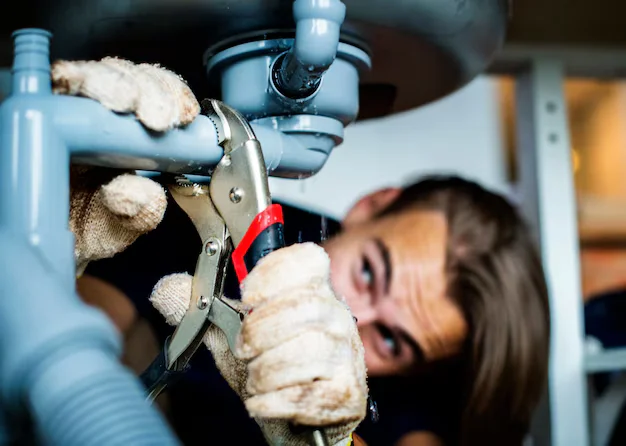Blocked drains are the usual issues in plumbing that can be really annoying and cause a hefty dent in your budget if not treated immediately. Symptoms of a clogged drain include slow drainage, foul smells, and water backups. Knowing what causes blockages and working towards restricting them can save you from unnecessary stress and expense.Here are some common reasons behind differently blocked drains and some simple solutions to consider:
Hair Buildup
Hair is one of the biggest culprits when it comes to blocking bathroom drains. Hair, when it falls into a drain, has the chance to clump and mix with soap, grease, and other wits. This forms a tangled mess that slows minor water passage and leads to a complete clog over time.
If left unattended, a hair clog could cause standing water to pool in your shower or sink, creating conditions for the development of mold and microbe proliferation.
How to Avoid This:
- Use a drain cover or hair catcher in the shower and bathroom sinks to trap loose hair before it enters the pipes.
- You should regularly clean the drain cover as well.
- Regularly remove any hair stuck in the drain after taking a shower.
- Do a monthly hot water flush in the drains with baking soda and vinegar mixed to break down little clogs.
Soap Scum
Soap scum could be a residue that is formed due to the mixing of soap and hard water minerals. With time, the sticky layer developed, which coats the inner parts of the pipes, reduces water flow and traps other debris.
Besides causing clogs, soap scum is also capable of promoting the succession of mold and mildew, which translates into bad odor and brings forth health hazards.
How to Prevent It:
- Use liquid soap rather than soap bars, as liquid soaps build up less residue than solid round bars.
- Installing a water-softener system; if hard water is present, it will help fight build-up of minerals in the drain.
- For general maintenance and to loosen soap scum that would otherwise harden, flush your drain at least once a week with hot water and vinegar.
Food Waste
Most people mistakenly think food scraps just wash away easily, but some forms of food waste can create a substantial blockage for the drainage. The starchy food like pasta, rice, and potato peels swells when added water is absorbed and can create a sticky paste that traps itself inside the pipe and thus clogs the drain.
Likewise for coffee grounds and eggshells, they do not dissolve well and, in fact, accumulate inside the drain and help form a blockage.
How to Prevent It:
- Always scrape any food scraps into the trash or compost, not the drain.
- Use a drain strainer and regularly empty it to allow only small food particles to go down the drain.
- For those who have garbage disposal, run plenty of cold water while using it to flush debris through the pipes.
Grease and Fat
Oils and grease are regarded as some of the worst offenders that cause clogged drains. While they may easily pour down the sink in their liquid state, these will harden once cool and stick to the pipe walls. This solidification creates a slow narrowing inside the pipes, leading to clogs.
Though that build-up may not block the drain straight away, it can develop to trap food particles and other debris, and that blockage can build into a serious one far downstream.
How to Prevent It:
- Do not pour cooking oil, fats, or grease down a sink. Cool them and dispose of them in a sealed container.
- Wipe greasy pans with a paper towel before washing them.
- Every now and then, pour boiling water down the drain to melt any small buildup of grease.
Foreign Objects
Garbage disposal and toilet systems cannot be used for anything else other than water, soap, or human waste. These, however, include cotton swabs, wipes, sanitary products, paper towels, and small toy pieces, which clog the sewer lines very frequently.
Although wipes and certain personal hygiene products are often marketed as “flushable,” the truth is that they do not disintegrate easily and can therefore be a more serious blockage issue.
How to Prevent It:
- Keep a trash bin in the bathroom to dispose of hygiene products properly.
- Teach the children about what should or should not go down the toilet to prevent clogging through their actions.
- Flush down only toilet paper and human waste.
Tree Roots
The roots of trees seek moisture and can target plumbing in underground drainage pipes as one of their rarest sources of moisture. Tree roots can enter through cracks or small openings in the pipes and lead to backups, pipe breakage, or a blockage in the sewage system.
Root growth creeps along with the flow of waste in the pipes once they have infiltrated the interior, compounding the situation of blockage over time.
How to Prevent It:
- Avoid planting trees or thick bushes nearby underground pipes.
- Call a plumber for an inspection in case tree roots invade the drainage system.
- Schedule regular drain cleaning services to prevent roots from growing inside pipes.
Mineral Buildup
Hard water is described as water sources that have higher than average concentrations of the naturally occurring minerals calcium and magnesium. Over time, these minerals build up in plumbing, which may cause severe pressure drops and blockages in water flow.
Build-up of minerals is a major condition which occurs in regions with hard water and leads to poor water pressure besides damage to appliances.
For Prevention:
- Install a water softener to minimize mineral load in the water supply.
- Regularly clean faucets and showerheads with vinegar to prevent mineral buildup.
- For minor mineral clarifying, use a strong vinegar-baking soda mix to unclog drains.
Poor Pipe Installation
Poor installation of plumbing can contribute to blocked drains. If pipes are poorly installed, water and debris can accumulate in some areas, resulting in frequent clogs.
If the drains in your house remain clogged still, no matter how much you take care of them, it is almost guaranteed that some misalignment or damaged pipe is somewhere in that system.
To Prevent It:
- If you are having frequent drum troubles, get a plumbing professional to inspect your system.
- Prevent plumbing problems by ensuring all plumbing works are done only by a licensed plumber.
- Replacement of old or damaged pipes will be able to save you from future blocks.
Final thoughts
Blocked drains are a common problem but mostly are avoidable. With care regarding what goes down the pipe and indeed care given to the drain itself, you can use a good and functioning plumbing system.
A few ways of preventing further blockages are drinking water hot tea with natural cleaners like vinegar and baking soda down the drains to regular plumbing inspections.
If blocked drains are sluggish, emitting horrible smells, or are frequently clogged, do not wait until it gets worse. A call to fix the sewer line at this stage may save you from costly repairs while taking care of your pipeline’s health.
So, through these simple guidelines, you can avoid clogging problems and keep your plumbing system working well in the house.







